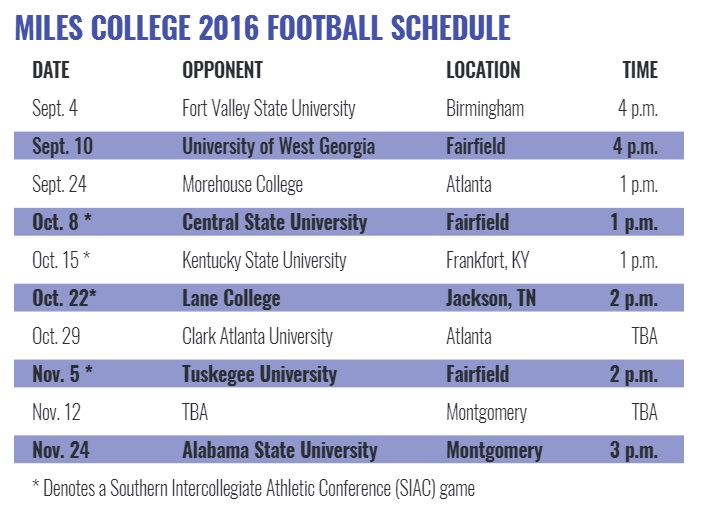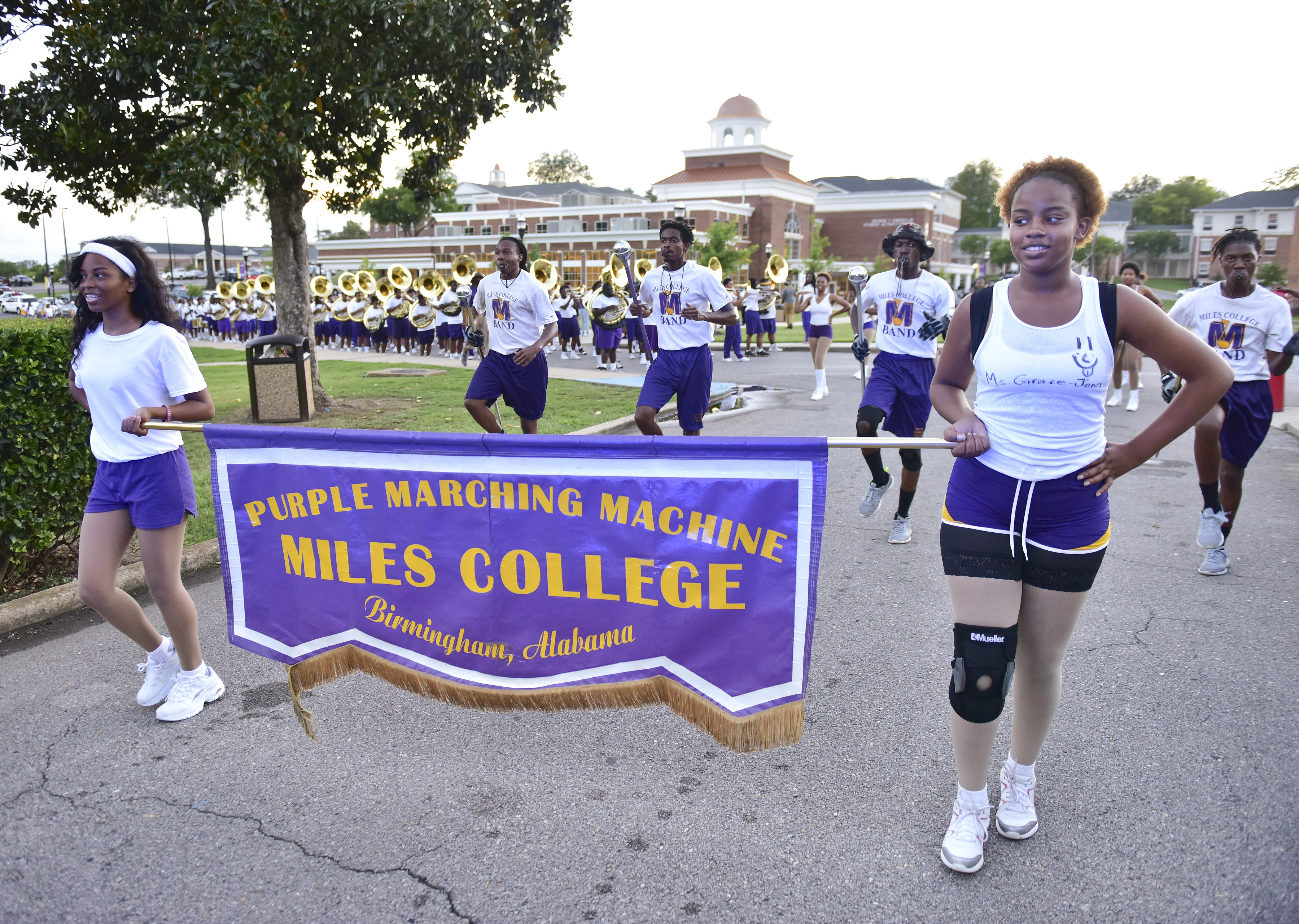
By Solomon Crenshaw Jr.
For the Birmingham Times
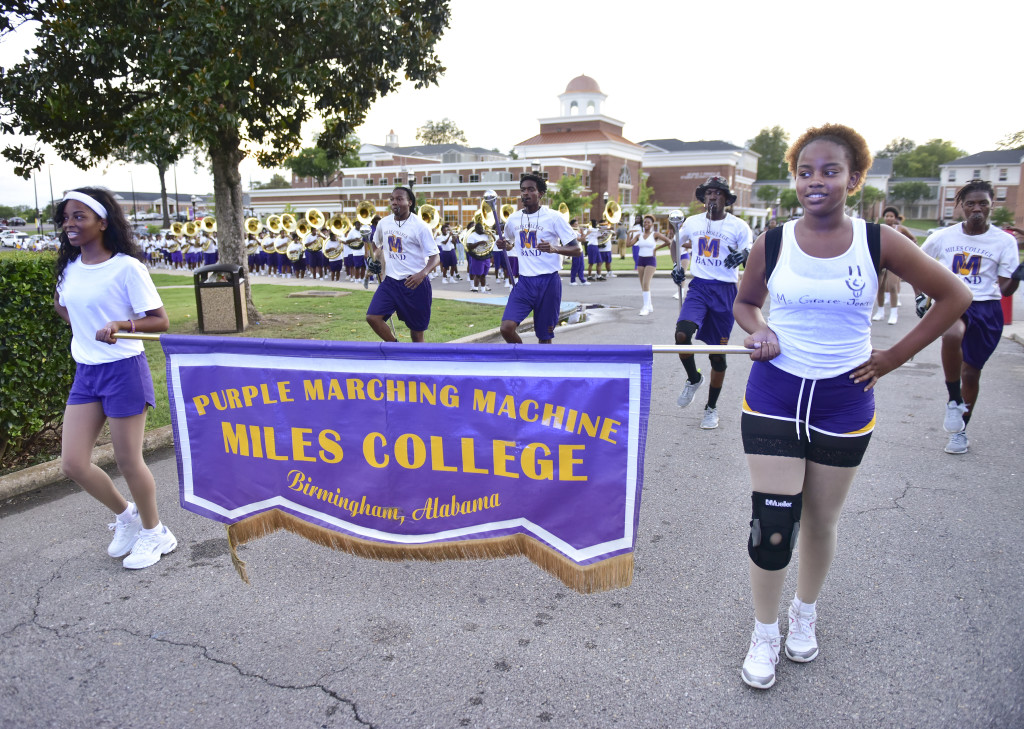
As a freshman, Abraham Tejeda said he got the same message from band directors and upperclassmen: To be part of the Purple Marching Machine you must persevere.
“They said I’d be happy in the end,” said Tejeda, a senior music major who plays the mellophone in the Miles College Marching Band. “They were definitely right.”
Perseverance has paid off for the Miles band—known as the Purple Marching Machine—which is celebrating its 20th year as football season draws near. Fans in the stands at Legion Field for the Labor Day Golden Classic between Miles and Fort Valley State University will hear the band play “It’s Our Anniversary” to commemorate that milestone.
Band Director Willie Snipes Jr., a Miles alum who was the first student to earn a music degree from the college, said he was attracted to the school because of the band.
“As a student, I wanted to come here because of the performance of the band,” said Snipes, who played trombone and baritone. “Before I got here, [former director Arthur Means Jr.] had to do a lot of recruiting because the program had never been heard of. As the band put on high-quality shows, students wanted to be a part of it.”
When Snipes arrived, Miles President George T. French Jr. asked if Snipes could build at least a 100-piece band. Snipes responded by calling for a new image and a new look, as well as an increased scholarship budget.
“Immediately,” Snipes said, “Dr. French came back and said he wanted to put that kind of work into the band.”
Snipes preaches that the Purple Marching Machine should be comprised of 200-plus clones, all sounding and looking alike. In truth, he acknowledges, the component parts should be so aligned with one another that they create a single sound with marching moves that are equally coordinated.
“The way the band performs is not an accident,” Snipes said. “Everything is strategically planned, and everything is on a drawing board of goals.”
The work has paid off. Recent accolades and accomplishments include:
- Giving a featured performance when current Democratic presidential nominee Hillary Clinton campaigned in Birmingham in spring 2016
- Being named the number 11 band in the country by Historically Black College University (HBCU) Digest
- Winning the 2015 Queen City Battle of the Bands in Charlotte, N.C.
- Performing during the halftime show when the Atlanta Falcons hosted the Chicago Bears in October 2014
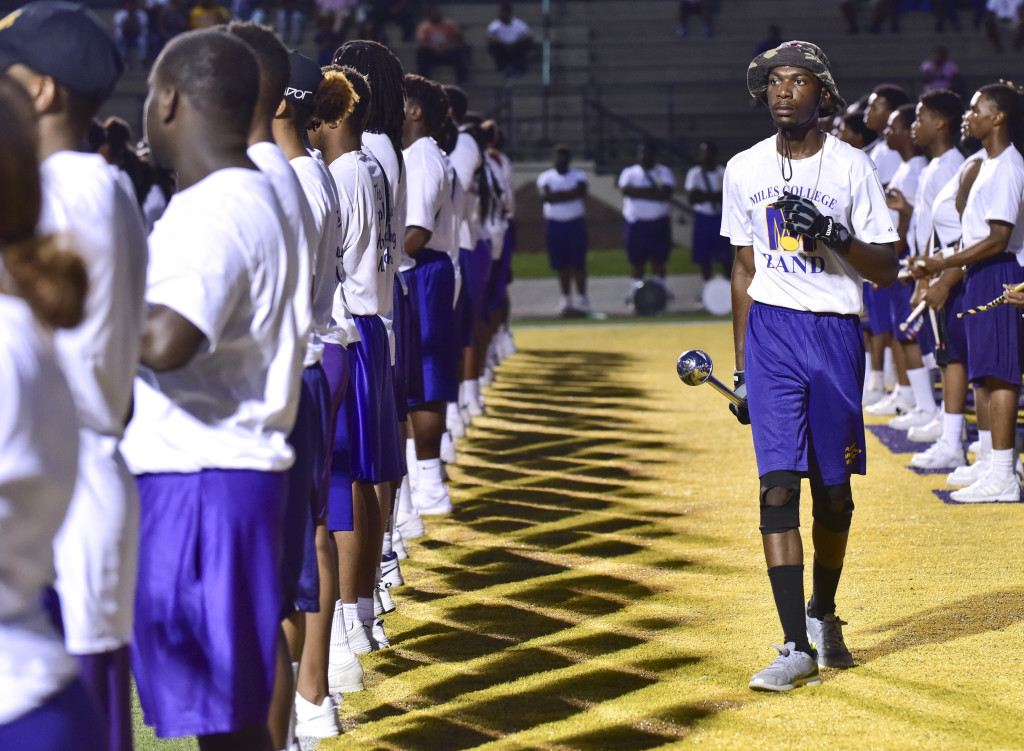
Persistence
But it hasn’t always been easy getting to this point.
The band began with 32 members in 1996 but grew to 192 in 11 years under Means, whose name is on the band building across the gravel parking lot from the gymnasium.
A series of different directors saw the band lose its luster as its numbers dwindled to 28. That’s when Snipes returned to serve as assistant director of bands under director James Merriweather Jr.
After Merriweather suffered a stroke in November 2015, Snipes became the first former Miles band member to lead the program. Bryan Nalls, who grew up with Snipes in a part of Woodlawn they called Cross Tenth, became assistant director.
Said Snipes: “I’m 35 years old, and I’m the head band director of an HBCU premier band. I’m probably one of the youngest to do it.”
With Snipes initially leading the recruiting push, the band mushroomed to 205, including its auxiliaries. The director proudly says his sousaphone section is among the nation’s largest, with 28 members.
A Day’s Work
The Miles College Purple Marching Machine gets started before dawn.
Musicians, dancers, and flag girls arrive at 5 a.m. to begin band camp. Physical training is done until 7 a.m., and is followed by rehearsal in the band room from 8 a.m. to 11 a.m.
As musicians prepare during their morning session, flag line co-captain Johnae Bennekin works with her squad. The members stand rigidly at attention as she urges them to focus.
“It’s just like being in the military,” said Bennekin, who is a senior. “If you’re at attention, there’s no movement at all.”
But when there is movement, it is coordinated.
“It’s the same as an instrumentalist,” Bennekin said. “If you hit a wrong note on your instrument, it’s noticeable. If you drop that flag, it’s noticeable. If you miss a count with that flag, it’s noticeable.”
After the morning session, there is a break—likely for much-needed nap time—followed by individual section work, dinner, and then what sometimes can be a three-hour session under the lights of Albert J. Sloane-Alumni Stadium.
Getting Adjusted
Tejeda said it was hard to get into the routine when he was a freshman.
“It still felt like nighttime,” said Tejeda. “As a freshman, I always questioned if I really wanted to be here because it is hard work.”
Junior Michael Cyrus, a Montgomery native who plays euphonium and majors in music education, recalls a similar experience.
“During my freshman year, we had to be ready and at attention at 4 a.m.,” he said. “It was worth every second to be part of this program and have the valuable learning experience.”
Cyrus initially had his heart set on attending another in-state university, but that changed after Merriweather came calling.
“He auditioned me and gave me my first scholarship,” Cyrus said. “They have a strong program, the bonding experiences are great, and the faculty is like family.”
Kymarte Jackson, a freshman trumpet player from Atlanta, Ga., initially went to Bethune-Cookman University in Daytona Beach, Fla., but found he was more comfortable at Miles. He recalled the movie “Drumline,” in which each section leader of an HBCU band tells his charges that theirs is the most important part of the band.
“The band’s attitude as a whole is the most important part,” Jackson said. “The attitude can determine how disciplined we are, how good we sound, and how well we perform.”
While band camp is largely intended to indoctrinate freshmen and put the framework in place for the program the band will perform, there are still classes to attend when school is in session.
“It’s like having two full-time jobs,” Tejeda said.
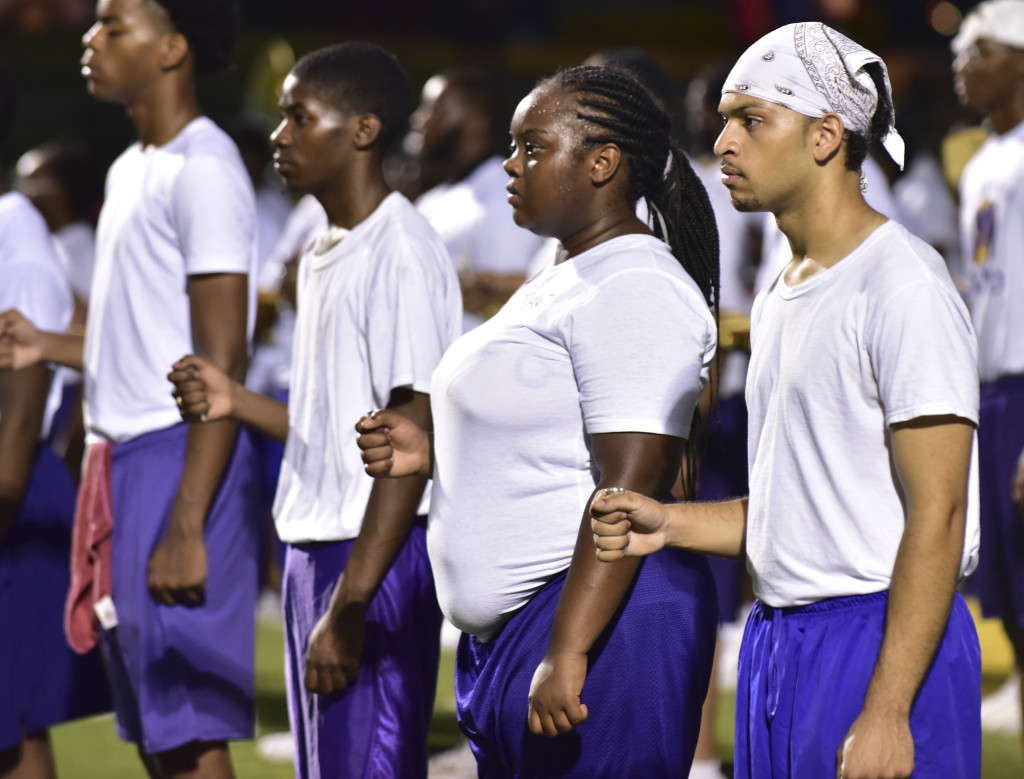
‘Pretty Rewarding’
Classes started this week, so practice shifted to 5:30 p.m. Band members schedule classes for early in the day, usually at 8, 9, and 10 a.m., and then at 1 and 2 p.m.
Stephaney Jackson, a senior criminal justice major and tenor drum section leader, said, “You’ve got to go to your dorm and sleep for at least an hour and a half or two hours to prepare for band practice at 5:15. We’ve got a long day ahead of us, and we already know what’s expected. We budget our time because we know what’s expected at band practice.”
Instrumentalists are presented with the challenges of mastering both the music and the moves because the band incorporates various dance routines, explained trombone player David Briguglio of Tampa, Fla.
“You have to really work on multitasking, being able to do many different things at the same time,” the fourth-year student said. “On the field, we have to make certain advanced kinds of music to make the selections sound more appealing to the audience. [There’s] that along with all the physical stuff we do on the field. We have to remember to be precise in our actions. It is stressful on the mind, but it’s pretty rewarding.”
After weeks of rehearsals, the band is ready for the show as Head Football Coach Reginald Ruffin’s defending 2015 Southern Intercollegiate Athletic Conference (SIAC) championship opens their season on Labor Day Sunday (Sept. 4, 2016).
Jackson, who went to Wenonah High School before attending Miles, said she understands the priority for many fans.
“You’ve got at least 70 to 80 people standing directly in front of the band as we play. They’re not even sitting down,” she said. “Their backs are to the football game, and they’re looking at us the whole time.
“You have those football people who come to watch football, but then you have the majority that come to watch the band,” Jackson said. “They’re down in front of us looking at the band. They’re sitting on the hill looking at the band. You can tell who’s there for the band and who’s there for football.”

